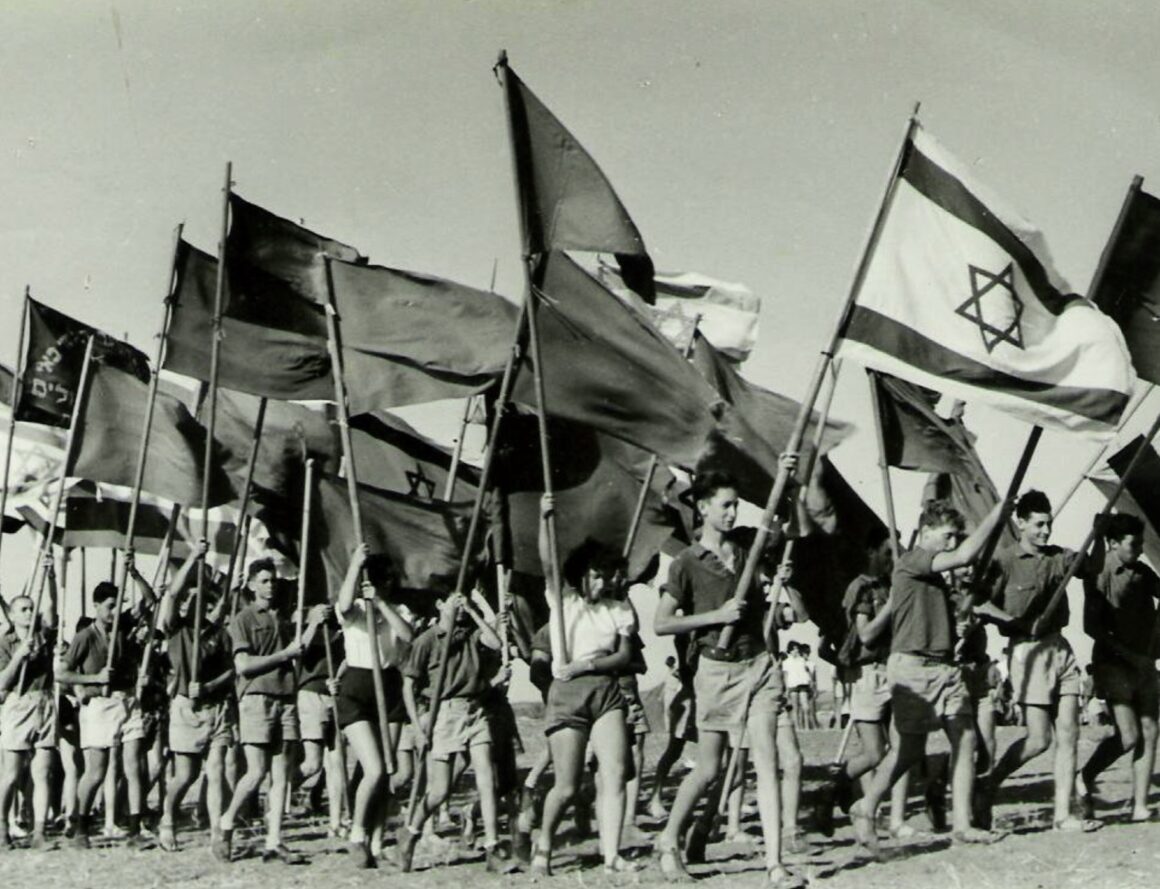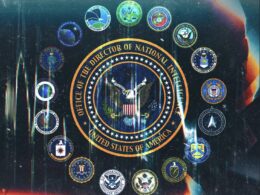This is from Chapter 3 of the book I’m writing, which will be called “When Tears Can’t Save Them: How the U.S. Pro-Palestine Movement Failed to Stop a Holocaust, & How it Can Still Win.”
When I set out to tell the story of the U.S. pro-Palestine movement’s failures, I knew this would involve delving into history. But I didn’t anticipate how far back I would need to look, or how relevant events from several generations ago are to the developments within the movement today.
For the anti-Zionist struggle to recover and succeed, it will need to progress towards a stage beyond campus organizing, and become primarily based within the workers movement. We face major obstacles to this, though; and to overcome them, we must look at how these problems came into being. This means investigating the history of how the U.S. labor movement became co-opted, and how the union bureaucracy got turned into a weapon against the anti-imperialist cause. Which is what let the imperial state isolate our social movements to the student element, then manage these movements through the NGOs and their affiliated orgs.
The launching of U.S. labor’s war against anti-imperialists almost perfectly matches with the timeline of the Zionist state’s creation. This is because both events were causally related to the start of the new cold war, and the ascension of the United States to global hegemon status. They also can both serve to teach us a crucial lesson: we must not embrace labor Zionism, or legitimize the destructive arguments that its proponents utilize.
Labor Zionism’s purpose was to divert the class struggle towards a project to steal land, and to advance imperial geo-strategic goals at the Palestinian people’s grievous expense. It employed a linguistic manipulation that’s historically quite common within politics, where the leaders of an ideological movement use the word “socialism” even when their beliefs have nothing to do with proletarian liberation. This is what the Nazis did as well; but the labor Zionists had a different goal with this rhetorical tactic than the Nazis did. They sought to win over people who had already come to communism, and they were greatly successful in this.
Many communists of the World War II generation embraced Zionism, which is the inverse to today’s situation; now, anybody who calls themselves a communist almost certainly abhors Zionism. But initially, the labor Zionist psyop was tremendously effective. And it paralleled the other psyops that our ruling class would target the workers movement with.
The Zionist entity, which had already existed in the form of a settler proxy force for the British, was able to gain official statehood in 1948 because of the possibilities the cold war had opened up. Now that the U.S. had become the hegemon, and had shifted from allying with the Soviet Union to waging war against it, the interests of the Soviets were in geopolitically outmaneuvering Washington. This was the primary factor that led the USSR to support the creation of a Jewish state: the Soviet leadership wanted a way to gain a strategic advantage, and assisting in the project to create “Israel” would let the Soviets better counter U.S. influence as Britain’s retreat left a power vacuum. I say “the Soviet leadership” because Stalin was not the one behind this idea; he recognized the reality of what Zionism would entail. Stalin was out-voted on the question of a Jewish state, though, and the USSR remained pro-Zionist until the 1967 land grab.
This detail is important to emphasize because left anti-communists often portray Stalin as a Zionist, when in fact his will was overridden by the historical momentum which Zionism had gained. Prior to World War II, Zionism had been a fringe ideology, predominant among the Jewish bourgeoisie rather than the Jewish workers. Then, when European Jews faced extermination and the imperialist countries refused to given them refuge, it came to appear to many of them that Zionism was the solution. The main element within the USSR’s government went along with this narrative, able to convince itself that using Palestine as a geopolitical pawn would be compatible with progress.
Regardless of the intent behind the decision, or the fact that Stalin himself couldn’t be blamed, it was an error. And the Zionist movement took advantage of this error to market its genocidal goals towards class-conscious people.
The USSR’s pro-Zionist policy had an ideological rationale behind it, wherein supposedly a Jewish ethno-state would evolve into something socialist; or at least this was the belief of the actual communists who’d bought into labor Zionism. The leading labor Zionists were the ones who had founded “Israel,” and therefore were directly behind the campaign to ethnically cleanse Palestine. They knew exactly what Zionism meant, and didn’t hold any illusions about it being compatible with racial equality.
At first, labor Zionism’s argument convinced many people who genuinely believed in the working class cause; it looked attractive to plenty of communists, including Jewish communists. But inevitably, this psyop would run into trouble. Since then, a cultural shift has occurred, and these manipulations no longer work on the most class conscious elements. Zionism’s dominance over the Jewish community is increasingly being threatened, with many Jews in the younger generation helping lead the pro-Palestine struggle. This is because the logic of labor Zionism, where supposedly an ethno-state is reconcilable with proletarian liberation, has been exposed as totally counter to reality. Since the Zionist entity was created, the Palestinian cause has gone from marginal to mainstream within American discourse, which is why there’s now such a big ruling class effort to co-opt this cause.
The Zionist project was undertaken at such a late point in history that colonialism’s barbaric thinking could no longer be accepted by the bulk of society, forcing the Zionists to constantly struggle against progress. And they likely would have lost this struggle by now, if the pro-Palestine movement had a substantial infrastructure within organized labor. But at the same time when “Israel” was founded, our ruling class undertook a sabotage campaign, one that ensured the U.S. workers movement would be separated from the world’s anti-colonial struggles.
The first step in this scheme was to divide the imperial center’s labor orgs from the unions of the colonized and formerly colonized world. This was what the Congress of Industrial Organizations did in 1949, when it initiated a split with the World Federation of Trade Unions. In 1945, the WFTU had been created with the purpose of giving representation to the union workers who were fighting against colonialism. Therefore the CIO–a union federation that encompassed not just the United States, but also Washington’s imperial partner Canada–had been looking to break ties with the WFTU as soon as possible. And when it did, this had a deeply damaging structural impact on the global workers movement, which won’t be healed until this division gets repaired.
It always hurts the workers movement when there are different unions trying to do the same job, or when unions that are supposed to be working together have lost their cohesion. In this case, it had a crippling effect, both inside the United States and worldwide. And this was just the prelude to the next step of monopoly capital’s destructive plan. Now that the ruling class had the USA’s unions isolated to the imperial sphere, it could psyop the country’s workers movement into becoming a tool for imperialist war, and for the domestic attacks against dissent.
This was the goal of the CIO, as well as the American Federation of Labor, when the two organizations merged in 1955. As William Foster observed, the merger had potential to bring great positive developments for the working class, as it represented a mending of a decades-long conflict between the two labor forces. But Foster was also looking at the sentiments expressed by George Meany (the leader of the new AFL-CIO), and by Walter Reuther. (Reuther was the president of the United Auto Workers, which at the time existed under the AFL-CIO umbrella). And what Foster saw was a plot to rally U.S. workers around the McCarthyist agenda, under the guise of saving organized labor from state attacks.
He noted that there was “A belief on the part of reactionary forces that if the workers can all be combined under one head, it will be much easier to cramp them into the service of American imperialism’s warlike foreign policies. In fact, according to the joint statement of Meany and Reuther, the united purpose of the new organization would be to mobilize the working men and women of this country to fight against ‘the challenge of Soviet Communist totalitarianism,’ i.e. to support the truculent foreign policies of the U.S. State Department.”
Proliferating labor Zionism was only the first stage in the effort to make the U.S. left compatible with Zionism, and with the broader imperial project. At the time when “Israel” was founded, there was a major effort to sell Zionism as being compatible with communism. This wasn’t just about dividing the communist movement from the Palestinian struggle; it was a covert way of getting communists to support the project for U.S. dominance. And this trick was extremely effective.
Even the Soviet leaders came to mistakenly believe that backing Zionism was the correct decision, and not even necessarily because of influence from imperialist psyops; these leaders had effectively tricked themselves. The USSR backed the Zionist project not because of “Stalinism,” or any other left sectarian scapegoat, but because it appeared to most of Stalin’s colleagues that the communist bloc would strategically benefit from leveraging the Jewish state’s creation. In the long term, this instead benefited the imperialists, giving Washington the geographic foothold that it needed to secure its hegemony.
The lesson from this is that if you’ve set yourself up against imperialism, forsaking solidarity with others who are resisting imperialism will only ever hurt you. It was always going to be that the global workers movement would either act in solidarity with the Palestinian people, or suffer catastrophic setbacks. The failure by many of the mid-century communist forces to oppose Zionism greatly contributed to the weakening of the U.S. labor movement, undermining the internationalist spirit which this movement depends on.
In 1945, William Foster observed just how instrumental solidarity would be to the proletarian movement’s success in the post-war era. He did so while arguing against the policies of Earl Browder, the CPUSA chairman who had acquiesced to the bourgeoisie’s liberal wing:
In the postwar world, which will face gigantic problems of industrial reconstruction and development, the United States, with its tremendous economic resources, is bound to play a very important role. What Comrade Browder does not see, however, is that if the role of the United States is to help in the realization of the programs of Moscow, Teheran and Yalta, this can only be accomplished if the broad masses of this country, especially the trade union movement, are very much on the alert to see to it that imperialist trends upon the part of our Government and the great capitalists are curbed and democratic policies imposed. The great goals of victory over fascism and the achievement of a lasting peace, laid down at Moscow, Teheran and Yalta, can be realized, but only upon the basis of eternal vigilance by the combined democratic forces of the world. Browder, contrary to this, is quite willing to leave the whole matter to the “intelligence” and “enlightened” self-interest of the big capitalists.
This was the essence of why McCarthyism could succeed: due to Browder’s influence, the U.S. communist movement was left unprepared for repression, even relatively mild repression. Browder had represented the practice of liquidationism, where a communist party gives up its role as a working-class force and becomes just another appendage for capital. Foster explained that Browder’s CPUSA had “habitually failed to criticize adequately the Roosevelt Administration for its shortcomings and to come forward boldly with its own proposals,” and “refused to criticize sharply the reactionary policies of the A. F. of L. Executive Council, except in the most flagrant cases.” Foster also decried Browder for “picturing the National Association of Manufacturers, the U. S. Chamber of Commerce, the American Bankers Association and other reactionary employers’ associations as progressive bodies and as qualified therefore to lead the nation in various branches of its economic and political policy.”
It was this capitulation, this willingness to pretend capital is our ally, that made the USA’s workers unable to defend against the schemes our ruling class then carried out. To regain what we lost, and become able to fight for the Palestinians effectively, we must learn from that great error. We cannot give into the temptation of opportunism, and make ourselves reliant on those whose interests are in defending capital.
This is the mistake that labor’s leaders have continued to make since then; and the solution is not simply to educate these leaders, because from their perspective it’s not a mistake at all. It’s the policy that serves them as members of the professional managerial class. Therefore we can’t enter into labor organizing with the mindset that the unions will be able to win us this fight, or at least all of it. We must work in the unions, but this tactic must merely be in service of the end goal, which is proletarian revolution. For our work in organized labor to be revolutionary, we have to use unions as an avenue for bringing the most advanced workers into independent worker institutions. And to do this, we need to understand exactly how our class enemies psyoped the workers movement; how they sold the idea that fighting on imperialism’s behalf would be in the proletariat’s interest.
————————————————————————
If you appreciate my work, I hope you become a one-time or regular donor to my Patreon account. Like most of us, I’m feeling the economic pressures amid late-stage capitalism, and I need money to keep fighting for a new system that works for all of us. Go to my Patreon here.
To keep this platform effective amid the censorship against dissenting voices, join my Telegram channel.








